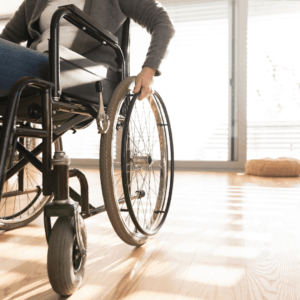In answer to the above question – most definitely, yes! Numerous trials and reviews now provide clear evidence that exercise is beneficial to older people and in fact, it has been shown that up to 42% of falls can be prevented by appropriately designed exercise programmes. Exercises which had the greatest effect on reduction of falls included activities which challenged the ability to balance and were carried out frequently (e.g. more than 2 hours per week for 6 weeks).1
NHS guidelines for physical activity for adults aged 65 and over are:
- Try to do some form of low intensity exercise every day.
- Aim for at least 2.5 hours of moderate intensity exercise a week which averages out to 30 mins most days, or 75 minutes of high intensity exercise (if you are already active).
- Do strength training 2-3 times a week.
- Work on balance and flexibility every day
What counts as low intensity exercise?
- Walking
- Chair-based exercises e.g. seated knee raises and knee extensions, sit to stand. Standing exercises using a chair for balance e.g. heel and toe raises, heel to toe stand, standing on one leg (alternating legs)
- Water walking
- Tai Chi
Literature reviews have suggested that low-intensity exercise (including chair-seated exercises, walking, Tai Chi, stretching) is effective in improving lower leg muscle strength and balance. This was evident in the reduction of fall risk and fall frequency.2
What counts as moderate intensity exercise?
- Light weight/resistance training e.g. working different muscle groups doing exercise repetitions using resistance bands, light weights or body weight to strengthen muscles
- Fast walking
- Hill walking
- Jogging
- Dancing
- Housework/Gardening e.g. vacuuming, mopping, mowing the lawn
Moderate activity will make you breathe faster and raises your heart rate, but you should still be able to talk.
What counts as high intensity exercise?
- Strength training (2-3 times per week) These exercises need to overload the muscles with enough weight/resistance so that only 10-15 repetitions can be done before muscles fatigue 3 e.g. weighted squats, lunges, deadlifts, bench press, push ups
- Running
- Fast swimming
- Heavy gardening e.g. digging
High intensity exercise makes you breathe harder and faster and you will find it hard to speak more than a few words!
Irrespective of age, it is possible to improve muscle strength and balance but for this to be performed safely and be effective in preventing falls, it needs to be gradual and sufficiently challenging to the individual. So, best advice is to seek help from a trained professional who can make initial assessments, deliver a programme of falls prevention exercises, adapt as necessary, and ensure progression at the right level.
Want to start being more active, get stronger and protect yourself from the risk of falls? For a friendly chat with help and advice on how to begin, contact us:
info@srphysio.co.uk
appointments@srphysio.co.uk
01603-208-238
- Sherrington et al. 2011. Exercise to prevent falls in older adults: an updated meta-analysis and best practice recommendations. N S W Public Health Bull. 2011 Jun;22(3-4):78-83
- Tse et al. 2015. Effect of Low-intensity Exercise on Physical and Cognitive Health in Older Adults: a Systematic Review Sports Med Open. 2015 Dec; 1: 37.
- Chodzko-Zajko et al. 2009. Exercise and physical activity for older adults. Medicine & Science in Sports & Exercise: July 2009 – Volume 41 1510-1530



